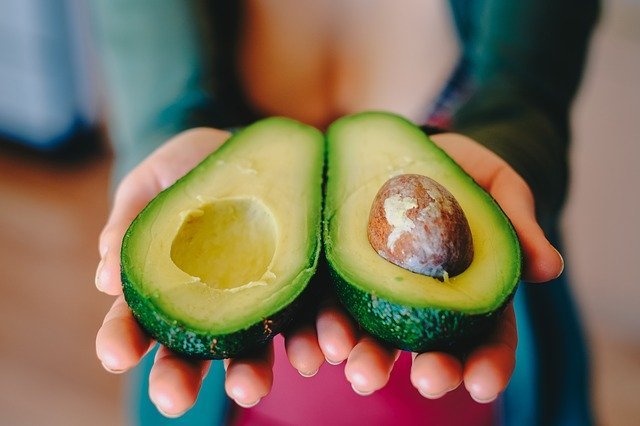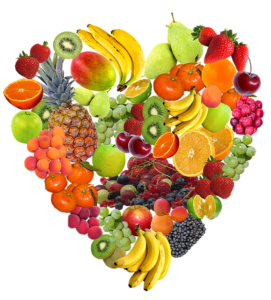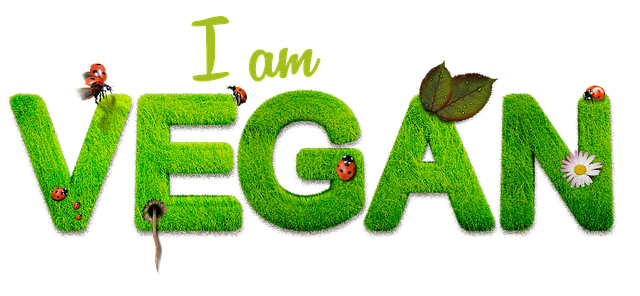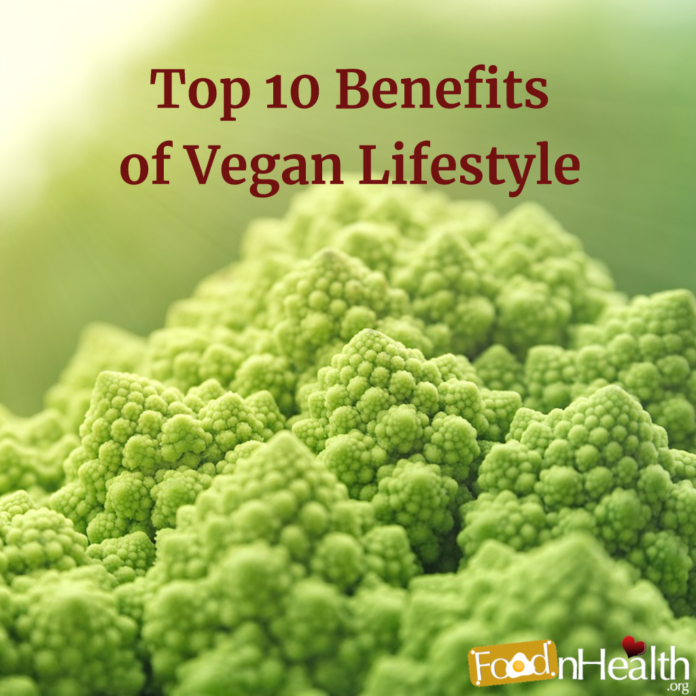A vegan lifestyle comes with a majority of benefits that often go unrecognized. As well as boosts to the immune and nervous system, vegan diets can protect us from developing diseases, as well as clearing up skin conditions and helping to have long-lasting positive impacts on our natural planet.
Here we list the top 10 important benefits of a vegan lifestyle.
-
A wider nutritional diet
A study conducted by Stanford University found that a low-fat vegan diet can be beneficial in helping to increase the intake of nutrients and antioxidants that help to protect the body against chronic diseases.
This is because a vegan diet consisting of things like unprocessed fruit, vegetables, whole grains, nuts, seeds, and beans can easily provide the recommended daily intake of nutrients. Plus, within these diets, higher levels of antioxidants, fiber, potassium, magnesium, folate, and vitamins A, C, and E have been recorded when compared to non-vegan diets.

However, it is important to keep a vegan diet balanced. At the other end of the scale, vegan diets are often found to lack B12, iron, calcium, and other necessary fatty acids like omega 3. Therefore the diet should be focused primarily on whole foods that are naturally fortified with nutrients. Occasional treats like gluten-free food hampers are a great way to maintain this balance.
-
A better overall mood
The Physicians Committee for Responsible Medicine (PCRM) conducted a study that assessed the eating habits and correlated moods of 3,486 people across a five-year time span. Interestingly the study revealed that those on plant-based diets reported fewer symptoms of a low mood, and tested less for depression.
Vegans and vegetarians experiencing more positive moods than meat-eaters have been attributed to the elimination of long-chain fatty acids such as arachidonic acid, most commonly found in meat and with associations to depression. Additionally, it’s thought organic foods give the mind connotations of freshness and strengthen our connection with nature – a commonly known method in aiding low moods.
-
Protection against diseases
Conclusive data has indicated that vegans and vegetarians both suffer less from diseases such as heart disease, hypertension, diabetes, and certain types of cancers which have been associated with modern Western diets.

These findings have been put down to vegan diets containing higher intakes of antioxidants, fiber, phytonutrients – chemical compound plants produce to aid their immunity to pathogens and predators, flavonoids – plant metabolites thought to provide antioxidant health benefits and carotenoids – plant pigments also thought to contain antioxidant benefits.
These diets are then free of the bacteria, parasites, and chemical toxins that are more commonly found in commercial meat, poultry, and seafood.
-
Aided weight loss
As well as providing access to a more nutritious diet, a whole food vegan diet can also help to keep daily calorie intake low because high fiber foods tend to not only be filling but also naturally low in calories.
In South Carolina, a randomized control trial observed the effects of plant-based diets on weight loss. A control group of 50 people was assigned to one of five different diets which offered no caloric restriction. Out of all five groups, the vegan group was found to have lost more than twice the percentage loss after 6 months.
-
Healthier Skin
Further scientific studies have begun to correlate skin problems such as acne to the intake of certain products, like dairy. Often, dairy products naturally contain growth hormones that could interfere with the human body’s hormonal balance and disrupt insulin levels, making skin conditions such as acne more likely.

This theory has celebrity endorsement too. Legendary singer Paul McCartney looks much younger than his 78 years and often accredits his vegan diet to not only his clear, youthful skin but also his ability to still perform grueling solo world tours.
-
Utilizing natural ingredients over chemical additions
Most recently, beauty companies have been scrutinized for their use of toxin parabens in their products. Ingredients such as parabens end up being absorbed by the skin and entering the bloodstream, where it’s thought they can have negative effects on the neuromuscular system, as well as both nervous and immune systems.
Vegan beauty companies are transparent in their mission to not use parabens or other toxic ingredients, and instead favor only natural ingredients. Vegan cosmetic companies are beginning to use extracts from real flowers, essential oils, and plant extracts to make their products. Plus most recently, ingredients like oats have been found to possess anti-inflammatory properties which are crucial in aiding skin conditions like eczema.
-
Supporting Sustainability

Vegan fashion brands are beginning to promote sustainability throughout their product lines by implementing naturally occurring ingredients such as leaf fibers, and recycled plastic such as fishing nets and water bottles.
Increasingly there are eco-friendly sustainable coffee cups that are not only reusable but are created from naturally occurring bamboo. This element ensures they are biodegradable, which means when they are eventually discarded they will be broken down back into the natural environment.
-
Preventing animal testing
Experts have long agreed that most animal reactions to a product cannot accurately predict human response to the same product. Additionally, pharmaceutical tests have revealed that up to 95% test as safe on animals, but then fail in human studies.
A key mission statement of the vegan movement has always been to protect animals and to prevent them from being used in trial studies of products and medicines. With more people than ever before aware of the increasing testing that occurs on animals, buying vegan products ensures that that conversation keeps occurring and spares animals from painful testing practices.
-
Leaving a smaller carbon footprint
Animal agriculture has been found to have negative environmental effects on both greenhouse gases and water consumption. For example, producing half a pound of beef for a burger product produces the same amount of toxic emissions as driving a car 9.8 miles, as well as requiring 3,000 liters of water to produce.
In contrast to this, half a pound of potatoes equates to driving a car 0.17 miles whilst a vegan burger product requires 75-95% less water than its meat counterpart. Overall, studies have shown that if these methods of production were to be followed, by 2050 the world’s overall food-related emissions would decrease by 70%, aiding the longevity and life of our natural planet.
-
Protecting the natural environment
In addition to increased greenhouse gas emissions and water consumption, animal agriculture also has impacts on our natural resources, for example, forestry and the oceans as well as the often-overlooked bee population.

Oxford University researchers revealed that in data taken from 40,000 farms across 119 countries, beef production was requiring on average 36 times more land than plant-based products like potatoes. In addition to this, overfishing is having a detrimental effect on the natural ecosystem of the oceans and scientists have warned that freshwater pollution from pesticides and herbicides is polluting essential waterways harming both animals and humans.
Vegan diets lessen the amount of deforestation needed to clear routes for farms, and in addition, help to restore the natural algae of the water systems by decreasing the amount of pesticides entering waterways. Vegan diets also benefit bees, whose colonies are being overworked to manufacture industrial quantities of honey for supermarkets and restaurant suppliers.


























